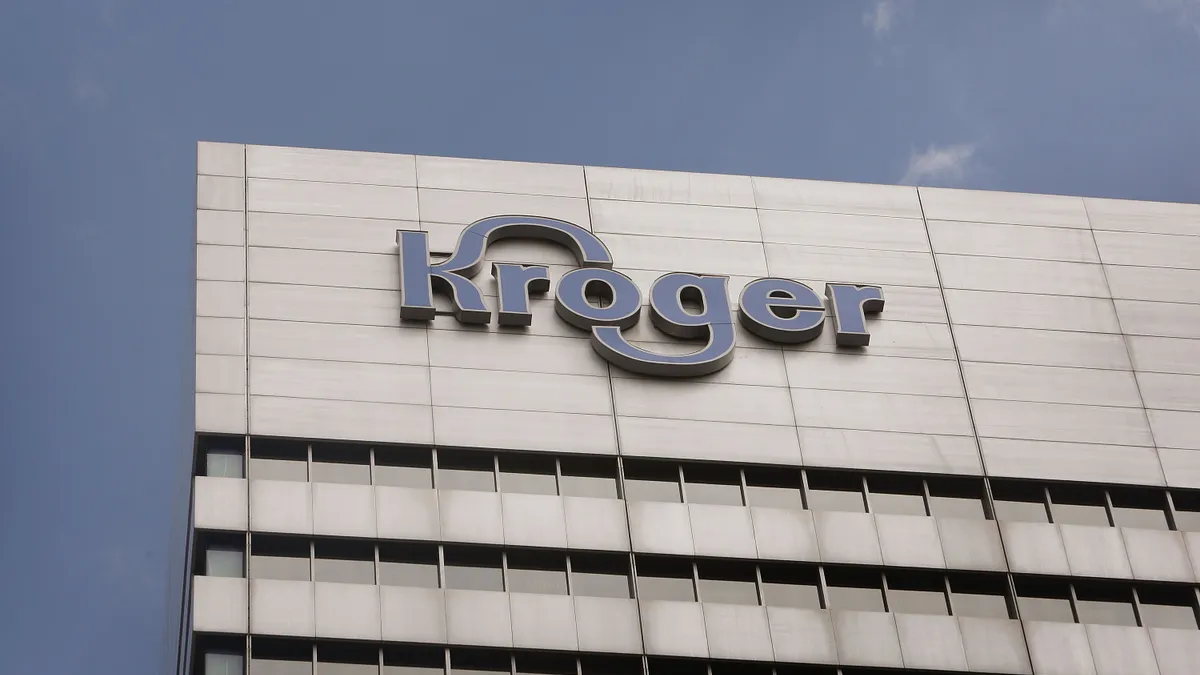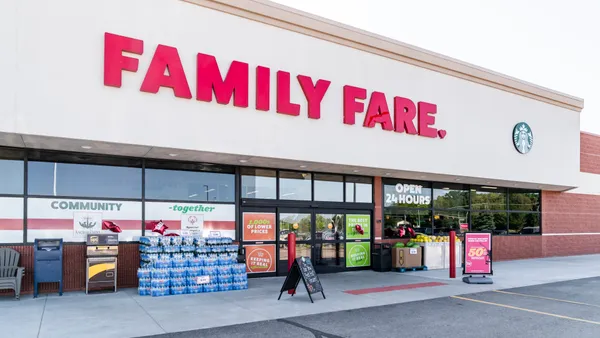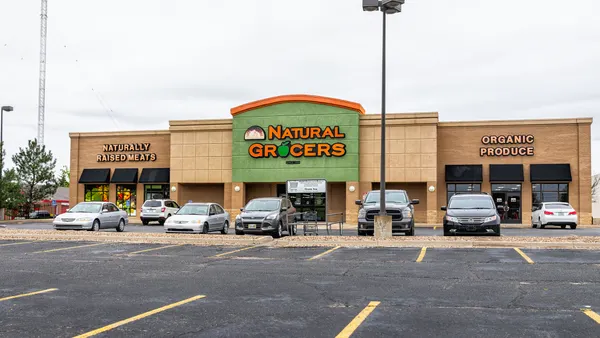Dive Brief:
- A federal judge has ordered Kroger and Albertsons to halt their plans to merge.
- The ruling Tuesday by Judge Adrienne Nelson of the U.S. District Court in Portland, Oregon, notes that “supermarkets are distinct from other grocery retailers” and that “the merger would lead to undue market concentration in multiple geographic markets in both the supermarkets and large format stores markets that would presumptively lessen competition.”
- The preliminary injunction follows a nearly monthlong trial during which the Federal Trade Commission said the grocers would harm consumers and workers if they were permitted to combine.
Dive Insight:
The federal order represents a substantial setback for Kroger and Albertsons, which had argued that they would be better able to compete together than as separate entities against non-unionized competitors like Walmart, Amazon and Costco.
The companies, which announced their plan to merge in October 2022, have the option to appeal the case to the U.S. Court of Appeals for the Ninth Circuit but convincing the appellate court to overturn Nelson’s ruling would likely be very difficult, said Spencer Waller, a professor at Loyola University of Chicago School of Law who specializes in antitrust law.
However, appealing the decision could take an extended period and would continue uncertainty about the companies’ future plans at a time when the grocery industry is changing on multiple fronts.
In an emailed statement, Kroger said the company is “currently reviewing its options.”
Most companies that have faced a similar situation in the past have abandoned their merger plans. Kroger lawyer Matthew Wolf said during the trial’s opening arguments that the issuance of an injunction would effectively end the merger push.
Almost an hour after the federal judge’s decision, a Washington state judge also ruled against the merger, dealing a second blow to the grocers’ combination plans.
Kroger has agreed to pay Albertsons a $600 million termination fee if the merger doesn’t happen.
While Kroger and Albertsons pledged a host of benefits to consumers if their merger went through, including $1 billion in price cuts, Nelson noted that “courts ordinarily must be skeptical of unenforceable promises.”
“A significant portion of the purported merger efficiencies are neither merger-specific nor verifiable. Without evidence of merger-specific, verifiable efficiencies, the benefits of which will be passed through to consumers, defendants cannot rebut the presumption of anticompetitive effects,” Nelson said in the ruling.
Kroger said the federal and Washington state decisions “overlook the substantial evidence presented at trial showing that a merger between Kroger and Albertsons would advance the company’s decades-long commitment to lowering prices, respecting collective bargaining agreements, and is in the best interests of customers, associates, and the broader competitive environment in a rapidly evolving grocery landscape.”
Albertsons also said in an emailed response it is disappointed by the decision.
“We believe we clearly outlined during the proceedings how the proposed merger would expand competition, lower prices, increase associate wages, protect union jobs, and enhance customers’ shopping experience,” Albertsons said. “We are carefully reviewing the Court’s opinion and are evaluating our options in accordance with the merger agreement.”
The FTC said the ruling marks a “victory” in the federal agency’s efforts to stop the merger.
“This historic win protects millions of Americans across the country from higher prices for essential groceries—from milk, to bread, to eggs—ultimately allowing consumers to keep more money in their pockets. … This is also a victory for thousands of hardworking union employees,” Bureau of Competition Director Henry Liu said in a statement.
A central tenet of the FTC’s case against the merger was that the companies would have amassed an unacceptable amount of control over the supermarket industry if they were able to merge, leading to higher prices and fewer choices for consumers.
Kroger and Albertsons hammered out a plan to divest almost 600 stores and other assets to C&S Wholesale Grocers as it sought to overcome regulators’ objections but were ultimately unsuccessful in convincing Nelson that the deal was sufficient.
During the federal court trial, the FTC zeroed in on its contention that the divestiture plan was insufficient while also characterizing Kroger and Albertsons as close competitors whose combination would result in higher prices and reduced competition for key services.
The FTC’s effort to stop the merger also drew on its claim that the merger would give the grocers the upper hand in negotiating with labor unions, an argument that analysts said represented a novel approach for regulators bent on stopping a merger.
Kroger and Albertsons also face a decision in the Colorado lawsuit against the merger. In July, a Colorado judge issued an order temporarily blocking Kroger and Albertsons’ proposed deal and granting the state’s request for a preliminary injunction. The grocery giants agreed to not consummate their merger until the state court rules on the lawsuit.















